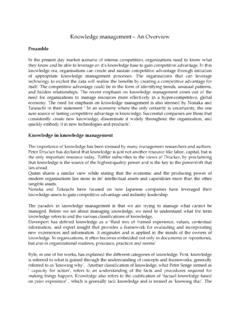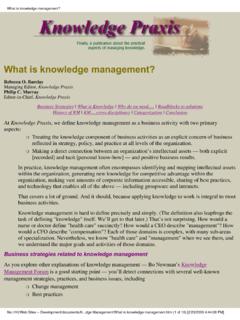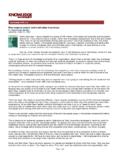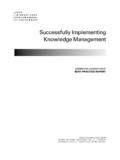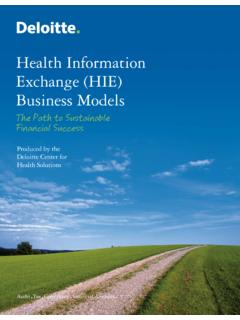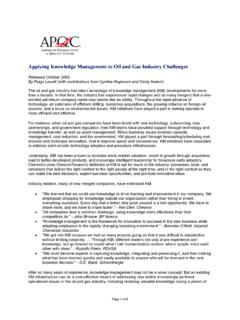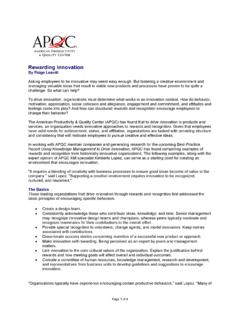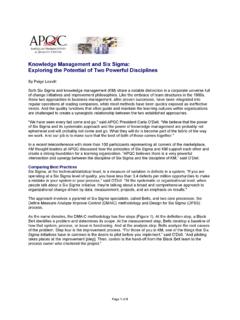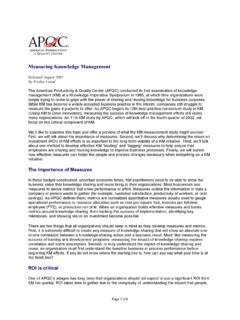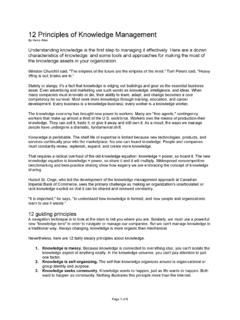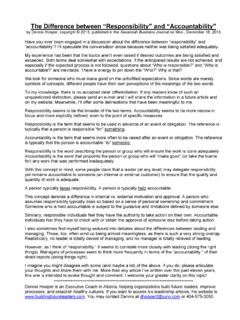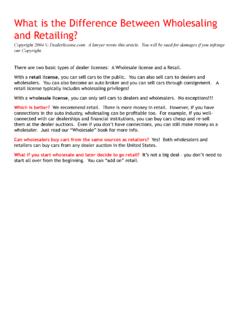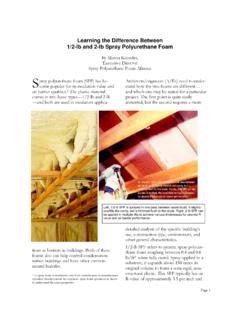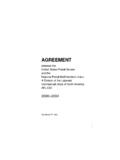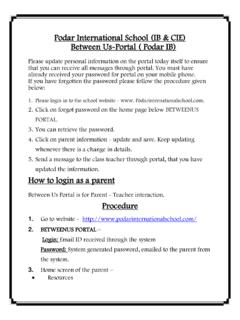Transcription of Understanding the difference between …
1 Understanding the difference between information management and Knowledge management Jose Claudio Terra, Terezinha Angeloni, TerraForum Consultores, Toronto, ON, Canada, M4L 3S5 Abstract This paper discusses the important differences between information management (IM) and Knowledge management (KM). One of the key premises advanced in this paper is that tacit and explicit knowledge are not the same knowledge in a different state. The act of writing and making one s knowledge available to others is in itself an act of learning and transformation of the nature of knowledge. In a general sense, it can be said that the human element is much more relevant from a KM perspective than from an IM perspective. Traditionally, IM has not taken into account how people learn, create, validate, codify, share knowledge and make decisions.
2 Its focus has been on the manipulation of data and information . Conversely, KM, as a more recent discipline, has a much broader ambition. The goal of this article is to discuss not only how KM and IM are different or similar, but also how and why these two disciplines intersect. The risks involved in KM projects that do not clearly take these differences into account are also highlighted in this paper. The paper is based on a literature review and authors own experiences with KM initiatives. Key Words information management , Knowledge management , information Technology, Tacit Knowledge, Intuition, Incentives, Risks, Reengineering Introduction It is commonplace these days to say that knowledge is the most critical asset to be managed. Yet not many people particularly not practitioners invest very much time in learning about what knowledge really is and how different knowledge management is from information management .
3 Particularly IM-focused individuals or software vendors tend to treat IM and KM as the same thing. However, the very act of managing and management science itself can be seen, to a large extent, as the application of human knowledge in an organizational context to achieve desired outcomes. Thus, managing knowledge can be defined very narrowly or broadly depending on a person s specific goals or perspective. A narrow definition of KM is usually associated with the deployment of information management systems, while broad definitions are usually associated with the softer side of management such as leadership style, organizational culture, rewards and recognition programs, etc. In this article, we will argue that despite the growing focus on information management systems as a key enabler of KM, knowledge management as an emerging discipline depends on the fusion of the contributions of many disciplines, including philosophy, psychology, sociology, management and economics that until recently did not cross paths.
4 Defining information and Knowledge In order to fully understand the differences between IM and KM, it is important to review basic definitions of information and knowledge. There has been no shortage of authors providing their own definitions of these terms. Thus, in this paper, we will not present our own definitions, but rather discuss the management implications of definitions provided by some leading authors. In general, the definitions of information tend to be far more uniform and less complex than the definitions of knowledge. information is usually defined as: 9 Organized data (Saint-Onge, 2002); 9 Data endowed with relevance and purpose (Drucker, 2001); 9 Interpreted data (Probst et alii, 2002). These definitions are similar to many others that point to the fact that information includes human participation in the purposeful organization of raw data.
5 Defining knowledge, however, is a much more complex task. One way to tackle this task is to go back to the roots of the Greek word episteme, which means absolute truth. That seems broad enough to include many subsequent definitions. What is absolute truth and how to reach it, however, have been questions plaguing many generations of philosophers since Aristotle and Plato. We will not discuss all the perspectives that many great thinkers have offered since then, but highlight that two main views have been put forth about how we learn and acquire knowledge: empiricism and rationalism (Gordon, 2002). The interplay between authors coming from these two camps offer us the current more accepted Understanding about knowledge. Namely, knowledge can only reside in one s mind and is the result of human experience and reflection based on a set of beliefs that are at the same time individual and collective.
6 The same complexity is highlighted by some of the leading authors in the emerging field of knowledge management . For instance, Davenport & Prusak (1998) define knowledge as a mix of fluid experiences, values, contextual information and intuition that provides a structure to evaluate and incorporate new experiences and information . It originates and is applied in the minds of individuals. This is similar to Nonaka & Takeuchi s definition (Nonaka & Takeuchi, 1995): Knowledge is true and justified belief . We could highlight many other definitions, but in our opinion, they would not add significantly to further clarifying the difference between information and knowledge. In general, all authors point to the complexity of knowledge compared to information .
7 The key difference can be summarized by the role played by human beings. In the case of knowledge, as simple as it may seem, individuals play a prominent role as creators, carriers, conveyors and users. In contrast, in the case of information , these same functions can happen outside humans and without their direct influence. Key differences between information and Knowledge management We will analyze the differences between IM and KM according to five different dimensions: 1. Interplay between information and Knowledge 2. IM and KM Projects: different scopes, approaches and measurement systems 3. Organizational Learning and KM 4. Broad Concepts of KM 5. Protecting Intellectual Capital: IM and KM Perspectives Interplay between information and Knowledge From a management perspective the key difference between information and knowledge is that information is much more easily identified, organized and distributed.
8 Knowledge, on the other hand, cannot really be managed because it resides in one s mind. Thus, KM is essentially limited to creating the right conditions for individuals to learn (using information and experiencing the world) and apply their knowledge to the benefit of the organization. The application of one s knowledge can, hopefully, thereby be translated into relevant information that is shared and used, new products and actions that create value. This Understanding of knowledge and KM can leads one to think about the well-known spiral of knowledge creation proposed by Nonaka & Takeuchi (1995). Although the authors agree with Nonaka & Takeuchi s view of how knowledge is created, we find it important to highlight that they do not clearly explain the different between information and knowledge.
9 In our opinion they use the term explicit knowledge almost as a synonym for the word information . This interchange, in our opinion, may have led many practitioners that read their contribution to quickly to think too much in terms of information management (IM) instead of Knowledge management (KM). One of the subtle aspects of the two distinctive approaches mentioned in the paragraph above is that as knowledge is turned into information (documents, best-practices, databases, etc) a transformation occurs. information is not the same as knowledge in a different state (outside an individual s head). During the process of speaking and writing individuals are not just downloading (using the metaphor of a typical download from the Internet) what they know.
10 They are, in fact, learning and transforming what they know into something that is materialized as symbols and that resembles what they know, but that is inherently different from what they know. As Polany (1997) once said: We know more than we can tell . When the required knowledge is somewhat more easily translated into codified information , we tend not to notice such an important difference ( instructions to operate a coffee machine). However, when the required knowledge is embodied in one s physical skills ( soccer player) and/or is related to complex knowledge that requires significant experience and analysis of many variables ( family doctor), then the inherent difficult of converting knowledge into information becomes more evident. A very interesting perspective that clearly distinguishes KM from IM has been offered by Von Krogh, Ichijo and Nonaka (2000).
